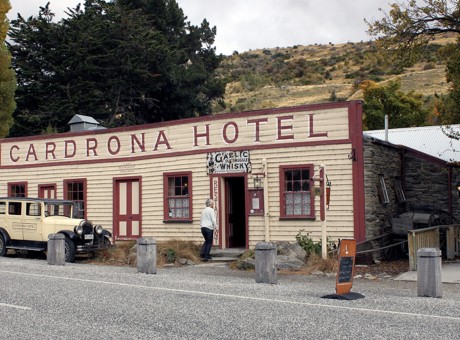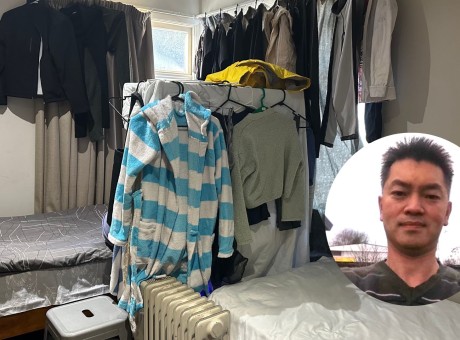Lewers’ mayoral campaign shown to contain serious misinformation: police involved
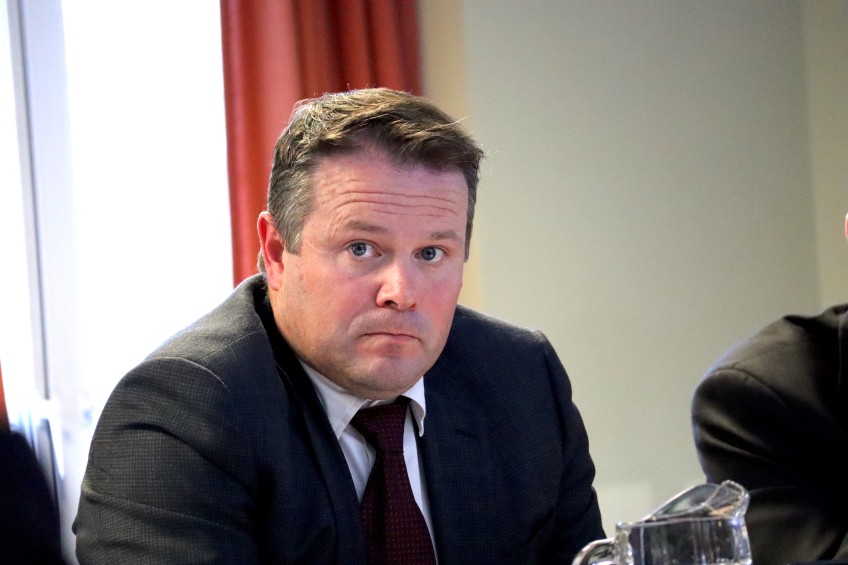
** Updated with new information from QLDC re: the performance of their Economic Development Unit.
Editorial/Analysis
In what increasingly is looking like a local dirty politics campaign QLDC’s electoral officer has requested campaign blogs by Glyn Lewers and Jon Mitchell to be removed.
Fact checks by Crux have shown serious elements of misinformation in Glyn Lewers concerted campaign against Olivia Wensley.
Mrs Wensley has this morning (Saturday September 24) taken her complaint to Queenstown police who have taken a statement from her that will be referred to the local CIB.
In this article we detail that misinformation and the calls late last night involving both QLDC CEO Mike Theelen, mayor Jim Boult, and QLDC electoral officer Jane Robertson.
The “Leaky Building” claims and a mysterious list that may not exist
Throughout the campaign so far both Mr Lewers and the Mountain Scene/ODT have published numerous articles linking Olivia Wensley to a large leaky building claim that may increase local rates, and according to Mr Lewers, prevent Mrs Wensley from participating in significant aspects of QLDC business.
As Mrs Wensley, and her family, are not a party to any of these legal cases Crux asked Mr Lewers yesterday how she could possibly be conflicted. The QLDC legal cases are against the council by owner/occupiers of the building based on events that happened 17 years ago when Mrs Wensley was a school student. Mrs Wensley's father in law was involved with the building company.

Olivia Wensley says she spoke with Mike Theelen on Friday night and was told there was "no list of conflicted people."
Mr Lewers told Crux yesterday (Friday, September 23) that Olivia Wensley was conflicted as her name appeared on a list, held by QLDC CEO Mike Theelen, and that the list represented “conflicted people” in respect of the first of two QLDC leaky building cases being defended by the council.
However, Mr Lewers was not able to produce a copy of the list to Crux and last night Mrs Wensley called QLDC CEO Mike Theelen and mayor Jim Boult to see if they knew of such a list.
Mr Lewers told Crux on Friday, while laughing, that we could use the Local Government Official Information and Meetings Act (LGOIMA) to see the list, knowing that such a process takes 20 days and that Crux has experienced ongoing problems in accessing information from QLDC using LGOIMA.
Mr Theelen denied the existence of such a list to Mrs Wensley last night and Mr Boult said that, although he had to stay out of election matters, it was “very unlikely” that there is such a list with the mayor also questioning whether Mr Lewers would have been given such a list if it existed.
Mr Theelen did not respond to questions from Crux.
QLDC electoral officer Jane Robertson last night, at the request of Olivia Wensley, asked Glyn Lewers to remove all of his blog and campaign material relating to the leaky building and “conflict of interest” claims.
As of midday Saturday September 24 Mr Lewers had not removed his posts.
Prior to Crux discussing the “missing” list with Mr Lewers he supplied pre-prepared answers to Crux questions on the “conflict of interest” situation – we reproduce those responses, together with those of Mrs Wensley, at the foot of this article.
Economic Diversification – Fact Check reveals serious flaws in Lewers’ claims
Glyn Lewers has made multiple claims opposing the extensive use of council consultants and focussing of “five full time economic development staff” at QLDC. “These are highly capable hardworking executives who have gone above and beyond during the pandemic” says Mr Lewers. The statements were made in response to Mrs Wensley's assertion that QLDC had been ineffective in the area of economic diversification.
Mr Lewers also claims the same team are about to release an “Economic Diversification Plan”
“To suggest there is of lack of economic development expertise on council
is inaccurate and absolutely refuted.” Source – Glyn Lewers campaign website.
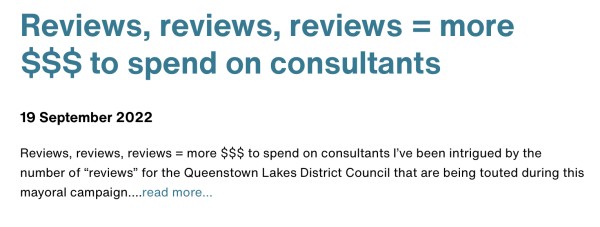
Glyn Lewers' mayoral campaign site features a post attacking QLDC's use of consultants.
Crux has discovered that two reports are being produced for QLDC on economic diversification by external consultants costing over $200,000, even though Mr Lewers says the EDU team are being paid $500,000 in salaries.
QLDC has told Crux that an Arrowtown based “strategy consultant” Kate Smith wrote an initial economic diversification document. Mr Lewers, when interviewed by Crux, could not remember Ms Smith’s name or how much she’d been paid. Mr Lewers then added “the operational side of procurement is not in the hands of council.”
Crux has found that the consultants used controversially by QLDC to test sentiment on airport expansion back in 2019, Martin Jenkins, are being paid $160,000 to produce a second economic diversification report.
Crux asked Mr Lewers why the council’s own economic development staff, on salaries that total $500,000 each year, could not write their own reports. Mr Lewers replied that they are probably too busy doing “more important things.” When challenged on what these “more important things" were, Mr Lewers said that Economic Development boss Peter Harris was currently studying “the lifetime value of a tourist.” (Editor's Note: QLDC has claimed since the publication of this article that the performance of their EDU is much broader than Mr Lewers has stated.)
Misinformation on the Queenstown Lakes Community Housing Trust and affordable housing.
Olivia Wensley was attacked by other mayoral candidates over her opposition to a proposed development charge to fund affordable housing that would ironically apply to the lower cost properties the charge is designed to fund.

QLCHT CEO Julie Scott - unintended consequence of inclusionary zoning fixed, but buried in an offical media release.
Crux was able to discuss this issue with QLCHT CEO Julie Scott and formed the view that this aspect of the new inclusionary zoning plan was something of unintended consequence that would be addressed by the Board of QLCHT.
This was announced yesterday, but it was in a media release written by Wānaka PR Celia Crosbie and QLCHT Chair Richard Thomas. The change in position on the unintended capture of lower value developments or single houses was buried towards the bottom of the media release.
That correction was welcomed by Olivia Wensley but resulted in Jon Mitchell saying:
“Despite rabid disinformation from one mayoral candidate to the contrary, the Queenstown Lakes Community Housing Trust is fully in support of the Draft Inclusionary Housing Policy recently adopted by QLDC for consultation.”
Potential conflict involving council candidate Lisa Guy.
In contrast to the “leaky building” conflict claims being touted by Glyn Lewers and Jon Mitchell against Olivia Wensley, another candidate appears to have a bigger problem.
Lisa Guy is the wife of Edward Guy, the main shareholder in Rationale, an Arrowtown consultancy firm that has done millions of dollars of work for QLDC.
Mrs Guy, when approached by Crux on the rule that blocks people with families earning more than $25,000 from QLDC, says that she has a special exemption from the Office of the Auditor General (OAG) based on the fact that QLDC is not currently working with Rationale.
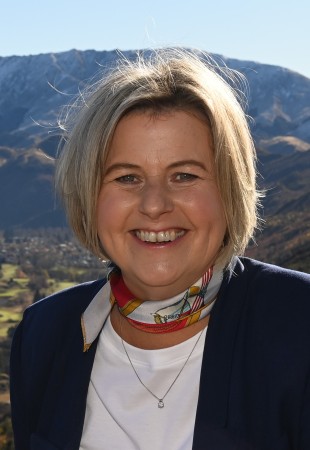
Arrowtown candidate Lisa Guy - claims special exemption from Auditor General in spite of husband's multi million dollar income from QLDC
Mrs Guy posted the following information on her campaign Facebook page:
“OAG has been provided with evidence that demonstrated no contracts exceeding $25,000 this financial year.
- no current contracts are in place between this company and the Council
- this company has not completed any work for the Council since March 2022, nor is there any such work forecast in the current pipeline of work.
“Therefore provided my husband’s business does not enter into any new contracts with the Council before election day ( 8 October 2022), the previous contracting arrangements between his business and the Council do not prevent me from standing for election to the Council in this triennium. “
Mrs Guy also noted that if QLDC does work with Rationale while she’s a councillor she will need to prove a “special case.”
Crux will continue to fact check statements as they are made in the course of the local election campaign.
Editor’s Note: Crux has reproduced our exchange of questions and answers with Glyn Lewers below, prior to our interview where we discovered his dependence on the “Theelen List” that no one can find any evidence for. Mrs Wensley’s responses are also published below.
Mr Lewers: Questions and answers
You didn’t mention a name, but the response came directly after Olivia was questioned regarding her association with Oak Shores. Are you referring to Olivia?
My mayoral campaign has been based around issues, not individuals, and I intend on maintaining that stance. Therefore, I won’t be naming individual candidates.
Can you specify exactly what you see the conflict of interest to be and what decisions the conflict would preclude her from if she was to become mayor?
Under The Local Authorities (Members’ Interest) Act 1968, you cannot:
- Enter into contracts with your local authority worth more than $25,000 in a financial year; OR
- Discuss or vote on matters before your authority in which you have a direct or indirect pecuniary interest, other than an interest in common with the public.
The role of the mayor is defined in 41A of the Local Government Act 2002, where it stipulates the mayor must lead and approve the development of four critical areas: the district’s Long-Term Plan, Annual Plan, policies and budgets.
Specifically, section 41A (2) of the Local Government Act states the following legal requirement for the “Role and Powers Mayors": “It is the role of a mayor to lead the development of the territorial authority’s plans (including the long-term plan and the annual plan), policies, and budgets for consideration by the members of the territorial authority."
Three of these four critical areas (75 percent of this clause) – leading the Long-Term Plan, Annual Plan and budgets – make up a substantial part of a mayor’s day-to-day role. While there are many other jobs a mayor undertakes within the role, it is these three areas that are essentially ‘bread and butter’. They also carry substantial financial implications.
For example, the elected official would not be able to attend formal and informal meetings, such as workshops, briefings, internal meetings with staff, and could not discuss budgets with the chief executive. The conflict is based on a financial impost on the council, so it is my view an elected official would be severely compromised in discharging their duty.
If an elected official – mayor or councillor – has a family association to anything related to the financial activities of council – whether it’s a $162 million claim or something else – it is not the fault of the elected official, it is a conflict.
Therefore if an elected official had links to an issue that could cause reported 9 percent rates increase, equivalent to an extra $305 to our rates bill every year for 30 years, the things that that would be expected for that candidate to step aside from would be:
- Setting the rates.
- Choosing which projects to exclude or forgo, to cover the extra expenditure.
- Leading or being a part of any discussion on a mitigation strategy.
- Be part of any briefing from Legal Counsel concerning the cause of the rate increase.
- Being able to attend parts of an Audit Finance and Risk Committee meeting.
A genuine concern is that the items listed apart from one and two would be in public excluded due to legal privilege to protect the ratepayer. How would trust and transparency be achieved?
From your knowledge of how council works, would a mayor having to manage such a conflict of interest be problematic and impede the effective working of the council?
If you look at the leaky homes claim that’s receiving a lot of coverage this election campaign, if a candidate is conflicted, that person would be precluded from any financial decision related to a claim that is 10 percent of our long-term plan and approximately 100 percent of our annual revenue. In my opinion, the conflicted person would be unable to discharge their duty as mayor or councillor.
Council staff would have to keep all information with regard to the above-mentioned items from the elected official. This would place extra burden on staff, not to mention cost, to develop firewalls and other internal systems of work to keep the information from the conflicted person. This additional work and cost could be entirely avoidable, if the elected official was not conflicted.
The council has had to spend $2.4m on lawyers’ fees, defending this $162m claim in the past nine months alone. A conflicted elected official won’t be able to be involved in the scrutinising of legal fees relating to this, and nor would they be able to participate in defending all residents in the Queenstown Lakes District. (This claim will be debt-funded so interest repayments of $305 per year for 30 years will be added to the rates bill of every homeowner in the district – not just limited to Queenstown).
Have you worked out the percentage figure you used or was that just an off the cuff comment?
As per my above explanation, my comment was specifically relating to Section 41A(2) of the Local Government Act 2002 (Role and Powers of Mayors).
Have you sought advice on the conflict of interest and the sorts of decisions Olivia would need to excuse herself from? Or was the comment based on your own knowledge and experience of council procedure? If you’ve sought advice - from whom, what’s their expertise?
As a sitting councillor and member of the Audit Finance and Risk Committee, I dealt with the previous claim (Reported $40m for the Oaks Shores Apartments) this current term. I have seen the required conflict question asked of the councillors relating to this case. I have sat in the legal briefings and attended the public-excluded parts of both the Audit Finance and Risk Committee and full Council, trying to determine an outcome in the best interests of the residents of the Queenstown Lakes District.
Ms Wensley's response
Glynn is confused about the interpretation of the clause he quotes. I do not have a "direct or indirect pecuniary interest". It's that simple.
Pecuniary interests are financial interests such as assets, debts, and gifts. A pecuniary conflict of interest may arise if a council member could reasonably be perceived as standing to gain or lose financially from decisions or acts for which he or she is responsible, or from information to which he or she has access.
A pecuniary conflict of interest could, for example, relate to the value of land or shares that a council member owns, or the turnover of a business in which a council member has an ownership interest.
Myself, my husband, and my father-in-law have no pecuniary interest in the Oaks Shores proceedings. We are not parties to the litigation, there is no pecuniary to be gained or lost by the outcome of the trial.
There is very little decision-making by the council to be made in regard to the litigation - it is in the hands of the court now, and a judge will decide the outcome.
It is unfortunate, and a bit embarrassing for him, that Glyn has a clear misunderstanding of such a basic tenet of the law.
This is exactly why it is so important to have council members, and a mayor who can correctly read and interpret statutes.
Read more: QLDC electoral officer: no power to force removal of Lewers' claim





